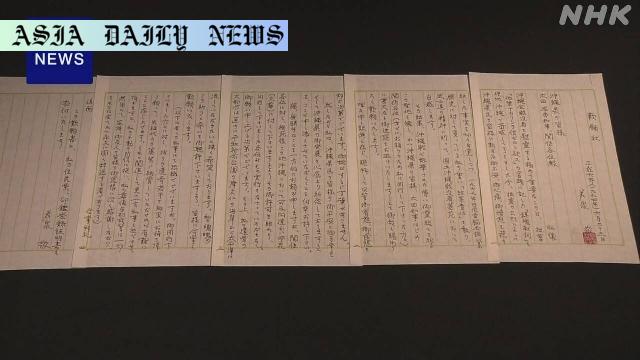Okinawa: A revealing note on a secret nuclear pact during the US rule to be formally donated, shedding light on historical accountability.
Key Point 1: Wakaizumi Kei’s note to be donated to Okinawa in the 80th year since WWII’s end.
Key Point 2: The note discloses a secret US-Japan nuclear pact tied to Okinawa’s reversion.
Key Point 3: The donation emphasizes historical accountability and aims to spotlight US military facility concerns in Okinawa.

A Historical Narrative: The Relevance of Okinawa’s Secret Pact
The donation of Wakaizumi Kei’s note related to a secret Japan-US nuclear pact marks a significant moment in understanding the historical nuances of Okinawa’s reversion from US rule. The five-page missive, dated June 23, 1994, is not just a personal narrative but also a detailed account that sheds light on the geopolitical complexities of the Cold War era. Addressed to the people of Okinawa, Wakaizumi’s words offer insight into a covert agreement between Japan and the United States, wherein the US pledged to remove nuclear weapons from Okinawa while retaining the right to reintroduce them during crises. This revelation underscores the delicate balancing act in reconciling Okinawan sovereignty with broader security concerns during the reversion negotiations of 1972.
June 23 is a day of solemn reflection in Okinawa, marking the end of organized combat in World War II. The alignment of this date with the content and significance of Wakaizumi’s note adds a layer of poignancy to its donation. By exploring the events and implications tied to this document, it becomes evident that historical accountability is a responsibility carried forward not only by governments but also by individuals like Wakaizumi, who bore personal anguish over the concentration of US military facilities in Okinawa. The donation serves as a symbolic gesture, inviting deeper examination of Okinawa’s past and its historical sacrifices.
The Hidden Layers of Diplomacy: Unearthing the US-Japan Nuclear Deal
At the heart of Wakaizumi’s revelation lies a clandestine geopolitical agreement born out of necessity and pragmatism. In the 1972 Okinawa reversion agreement, the US government consented to the withdrawal of its nuclear weapons from Okinawan soil. This decision, however, was tempered with a secret clause that allowed for their reintroduction during times of acute crisis. Such an arrangement reflects the Cold War anxieties prevalent during the era and underscores the strategic value attributed to Okinawa as a military hub.
Wakaizumi’s personal note penned in 1994 encapsulates the ethical dilemmas and emotional burdens he carried as a secret envoy during these negotiations. By publishing his accounts and now, through the symbolic transfer of his note to the Okinawa Prefectural Archives, Wakaizumi’s legacy is memorialized as a reminder that diplomacy often operates in gray areas. The retention of the US’s ability to reintroduce nuclear arms in Okinawa raises questions about the autonomy of the prefecture in such matters and highlights the complex interplay between national security imperatives and regional sentiments.
A Tribute to Historical Accountability and Legacy
The planned donation of Wakaizumi’s note is particularly relevant in the 80th anniversary year of World War II’s conclusion. It brings historical and ethical accountability into focus. The initiative by the document’s current owner to pass it on to the Okinawan archives ensures that future generations have access to this vital piece of history. Displaying the note reinforces Okinawa’s unique status as a region that continues to grapple with the repercussions of its post-war agreements and its role in international security frameworks.
This development also rekindles the debate over the presence of US military bases in Okinawa and the associated tensions. Wakaizumi’s expression of regret and responsibility for these lasting issues invites broader reflections on the burden borne by those who navigate between higher national interests and local community welfare. As Okinawa’s history unfolds, moments like this donation are critical in shaping the discourse on sovereignty, military strategy, and historical remembrance.



Commentary
The Historical Depth of Wakaizumi Kei’s Note
Wakaizumi Kei’s note illuminates an aspect of post-war history that remains shrouded in complexity and tragedy. It is not merely a document but a testament to the depth of individual responsibility amid governmental negotiations. As a professor of international politics, Wakaizumi found himself in a precarious position, mediating between Japan’s sovereign interests and the United States’ Cold War imperatives. His decision to reveal the secret pact several decades later indicates the weight of accountability he carried throughout his life. The proposed donation provides us with an avenue to connect with the struggles of individuals like him, who made profound contributions to history at great personal cost.
The Legacy of Okinawa’s Wartime and Post-War Experience
Okinawa occupies a unique place in global history as both a site of intense World War II conflict and a focal point of post-war geopolitical rivalry. This legacy is not only documented in official accounts but is also preserved in personal records like Wakaizumi’s note. By tying the contents of the note to larger debates around sovereignty, local welfare, and military presence, the donation opens new discussions that are both timely and essential. It ensures that this piece of history is made accessible for future generations, allowing them to reconcile the past with the present challenges faced by Okinawans.
Ensuring a Balanced Perspective on History
The act of donating Wakaizumi’s note is not merely about preserving history; it is about broadening perspectives. This gesture highlights the often-overlooked sacrifices of Okinawa and underscores a key tenet of democratic values: transparent accountability. By confronting such histories, we foster more robust discussions around the ethics of governance and diplomacy, ensuring that the mistakes and struggles of the past inform more equitable futures. This occasion serves not only as a commemoration but also as a clarion call for justice, fairness, and historical understanding in policymaking worldwide.